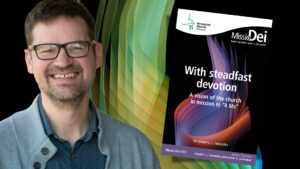Mennonite Mission Network—In a park near Macau Mennonite Church, a group of mainly women can be seen daily moving in unison, offering rhythmic praise in a form unlike a typical Sunday morning service.
To the left they sway, gracefully swirling their arms to the music, toward the sky, and then the same motion to the right. Forward they step, arms pumping, like synchronized swimmers on land. They smile as sweat beads cool their foreheads.
“I think it’s beautiful to see people moving together,” said Tobia Veith (Cornerstone Mennonite Church in Saskatoon, Sask.), a joint worker of Mennonite Church Canada and Mission Network, and one of the founders of the church on the southeastern edge of China’s mainland, explaining the praise dance group experience. “It’s a picture of unity and joy in working together.”
Originating across the water in Taiwan, praise dance participants move to worship music. At first glance it might appear like tai chi, a Chinese meditative exercise rooted in the martial arts.
Dancing in groups in parks is already a long tradition in Chinese culture and society, so praise dance is an appropriate form of outreach in this cultural context, Veith said.
The music is composed by Wu Mei Yun, a Christian and retired music teacher in Taiwan. She also choreographed the dances, using a range of styles from Chinese traditional to aboriginal, to Spanish, Hawaiian, ballet, pop and hip hop. The lyrics are Bible passages.
Praise dance offers health benefits such as reduced stress, weight loss, and the increased joy of connecting with others.
The latter reason is why earlier this year church co-pastors Treasure Chow and her husband, Bailey Chow, began the praise dance group in the park as a form of outreach. Treasure Chow leads the group, having taken a 10-week instructor training course in 2010. Since the group formed, women who were not members of the church, but who had been exercising regularly in the park, have joined, bringing the total to 10.
“One thing that was interesting is when Pastor Bailey was ordained, the ladies (non-church members) were really eager to help,” said Veith, who dances with the group occasionally. “For some of them, it was their first time in church.”
“What’s happening is that as the women get to know each other, they start to share their challenges,” she said. “So they (church members) begin to pray with them and share more about Jesus.”
Veith regularly attends a different morning praise dance group of about 40 members near her home in Taipa. She has similar experiences sharing with women who were otherwise disconnected from church. There are two men in thatgroup.
Bailey Chow, the only man in the Macau Mennonite Church praise dance group, said he enjoys participating as a regular member, rather than as a leader. Learning the movements along with the other beginners has strengthened his bond with members of his congregation.
“First, I wasn’t used to being the only man, but it’s healthy for anyone of any age, man or woman,” he said. “I’m happy to go every day and soak in God’s word. It’s a whole person activity. I’m just hoping that in more and more other countries there will be an opportunity for praise dance to help people get to know God and to help their bodies.”
There are praise dance groups in Macau in two other parks, in four other churches, and at a senior citizen center, Veith said.
“As mission workers, we do hope for the day to come that they (participants who aren’t church members) will embrace Jesus and become disciples,” she said. “We seek to authentically share life with them, and believe that God’s Spirit will work through that with members of his congregation and others in the praise dance group.”
##
Mennonite Mission Network, the mission agency of Mennonite Church USA, leads, mobilizes and equips the church to participate in holistic witness to Jesus Christ in a broken world. Media may contact Andrew Clouse at andrewc@mmnworld.net, 574-523-3024 or 866-866-2872, ext. 23024.






